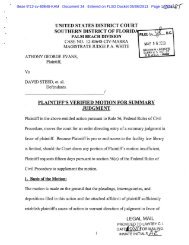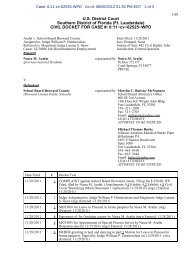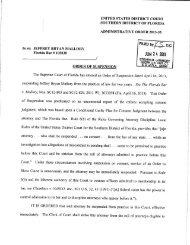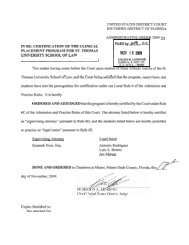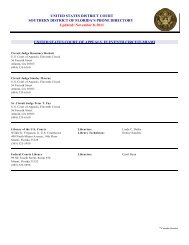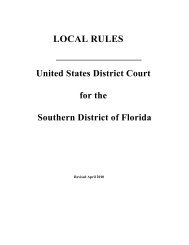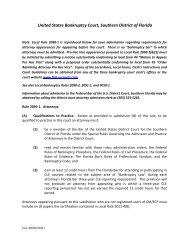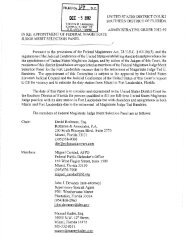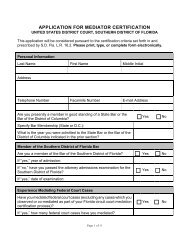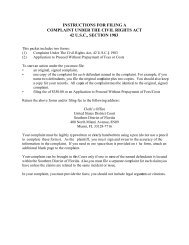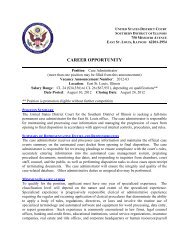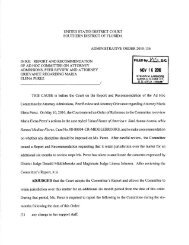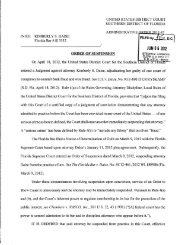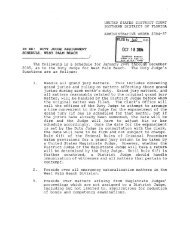JAN j 6 2010 - United States District Court
JAN j 6 2010 - United States District Court
JAN j 6 2010 - United States District Court
You also want an ePaper? Increase the reach of your titles
YUMPU automatically turns print PDFs into web optimized ePapers that Google loves.
subject to the objection. A lawyer who improperly instructs a witness<br />
not to answer runs a serious risk that the lawyer and/or the client may<br />
be subject to substantial monetary sanctions, including the cost of<br />
reconvening the deposition (travel expenses, attorneys' fees, court<br />
reporter fees, witness fees, and the like) in order to obtain the answers<br />
to such questions. See also Local Rule 30.1.<br />
(3) Other Restrictions on Deposition Conduct. Federal Rule of Civil<br />
Procedure 30(d)(1) and Local Rule 30.1, particularly the local rule,<br />
focus on proper and improper conduct by counsel at depositions. Counsel<br />
should not attempt to prompt answers by the use of "suggestive",<br />
"argumentative," or "speaking" objections; off the record conferences<br />
between counsel and witness are inappropriate; instructions not to<br />
answer are limited; and witnesses should be treated with courtesy.<br />
Those conducting depositions under the Local Rules of this <strong>District</strong><br />
should take careful note of the provisions of Local Rule 30.1, entitled<br />
"Sanctions for Abusive Deposition Conduct."<br />
C. Production of Documents, Electronically Stored Information and Things<br />
at Depositions.<br />
(1) Scheduling. Consistent with the requirements of Federal Rules of<br />
Civil Procedure 30 and 34, a party seeking production of documents,<br />
electronically stored information or things of another party in<br />
connection with a deposition should schedule the deposition to allow for<br />
production in advance of the deposition.<br />
(2) Option to Adjourn or Proceed. If requested materials are not<br />
produced prior to the deposition, the party noticing the deposition may<br />
either adjourn the deposition until after such materials are produced or<br />
may proceed without waiving the right to have access to the materials<br />
before finally concluding the deposition.<br />
(3) Subpoena for Deposition Duces Tecum. A non-party can be compelled to<br />
make discovery in an action only by means of a Federal Rule of Civil<br />
Procedure 45 subpoena. Parties to litigation open themselves to broad<br />
discovery practices encompassed in Federal Rules of Civil Procedure<br />
30 (b) (5) and 34.<br />
Federal Rule of Civil Procedure 45(a) states in relevant part that:<br />
(1) Every subpoena shall (A) state the name of the court from which it is<br />
issued; and (B) state the title of the action, the name of the court in<br />
which it is pending, and its civil action number; and . . . (2) ... A<br />
subpoena for attendance at a deposition shall issue from the court for<br />
the district designated by the notice of deposition as the district in<br />
which the deposition is to be taken.<br />
Consequently, a subpoena for the deposition of a non-party, in a lawsuit<br />
pending in the Southern <strong>District</strong> of Florida, that is scheduled to take<br />
place in the Northern <strong>District</strong> of Florida, should be headed with a<br />
Northern <strong>District</strong> of Florida caption.<br />
Additionally, if the non-party recipient of a Federal Rule of Civil<br />
91



